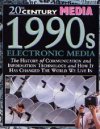Electronic Paper Turns a Page Additional Information
Sohn, Emily. 2003. Opening a window on video paper. Science News for Kids (Oct. 1). Available at http://www.sciencenewsforkids.org/articles/20031001/Note2.asp.
You can learn more about electronic paper and ink at computer.howstuffworks.com/e-ink.htm (How Stuff Works), www.media.mit.edu/micromedia/elecpaper.html (MIT Media Laboratory), and www2.parc.com/dhl/projects/gyricon/(Xerox PARC).
Books recommended by SearchIt!Science:
 |
20th Century Media: 1990s, Electronic Media — Steve Parker
Published by Gareth Stevens, 2002.
As the 20th century drew to a close, more words and pictures were available to the public than ever before. This book surveys mass media during the 1990s, explaining the developments of technology as well as the changes in popular culture. Digital systems, expanded television options, the growth of the Internet, hidden microphones and privacy issues, round-the-clock live news, and mp3 technology are all discussed. The book’s double-page spreads also highlight new special-effects technologies in filmmaking, Bollywood and the Blair Witch Project, Britpop, boy bands and girl bands, sports in the mass media, cybercafes, and Nelson Mandela. |
Power Words
charge A property of all particles of matter that causes them to be attracted to or pushed away from other particles. Particles with the same charges drive each other away; particles with opposite charges draw each other together. Protons have a positive charge, and electrons have a negative charge.
Nature likes things to be electrically balanced or neutral, with equal amounts of positive and negative charges. To achieve this balance, atoms give up or take up electrons, the particles that have negative charge. This giving and taking of electrons is how chemical elements combine to make compounds.
electrode A piece of metal or carbon through which an electric current can enter or leave an electric device. Batteries have two electrodes, positive and negative.
electronics The science that deals with electrons and with devices and systems that operate by using electrons. Electronics has led to the development of radio, TV, flights in space, and computers.
Copyright © 2002, 2003 Houghton-Mifflin Company. All rights reserved. Used with permission.
